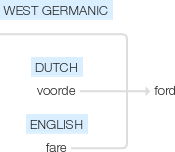Ford
Old English, of West Germanic origin; related to Dutch voorde, also to fare.
wiktionary
From Middle English ford, from Old English ford, from Proto-West Germanic *furdu, from Proto-Germanic *furduz, from Proto-Indo-European *pértus(“crossing”).
Cognate with firth and fjord (via Old Norse), Low German Föörd, Dutch voord, German Furt, Norwegian and Danish fjord, and more distantly with English port (via Latin). See also forth and Persian پل.
etymonline
ford (n.)
Old English ford "shallow place where water can be crossed," from Proto-Germanic *furdu- (source also of Old Frisian forda, Old High German furt, German Furt "ford"), from PIE *prtu- "a going, a passage" (source also of Latin portus "harbor"), from root *per- (2) "to lead, pass over." The line of automobiles (company founded 1903) is named for U.S. manufacturer Henry Ford (1863-1947).
ford (v.)
"to cross a body of water by walking on the bottom," 1610s, from ford (n.). Related: Forded; fording.
